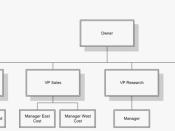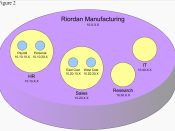Running head: Active Directory � PAGE \* MERGEFORMAT �2�
Active Directory Implementation Plan
POS/421
Riordan Manufacturing, Inc. is an industry leader in the field of plastic injection molding (Apollo Group, Inc., 2004). With locations in in San Jose, California, Albany, Georgia, Pontiac, Michigan and Hangzhou, China, Riordan is poise to continue leading the industry in their niche of plastic manufacturing. Recently, Riordan recognized a need to upgrade their existing network to include Microsoft's Active Directory. Riordan already houses an existing network at their multiple locations but lack the consistency, control, and centralization that Active Directory can provide. Based upon thorough examination of the company needs and existing infrastructure, we recommend s solution that is not only an upgrade in technology, but efficiency.
Active Directory will give the System/Network Administrator more control over group policies. With the advanced control over group policies, the Network/System Administrator will gain according to Microsoft "Enhanced Securityâ¦Improved Customer Satisfaction and Reduced Help Desk Costâ¦Increased Data Safety and Availabilityâ¦Flexible Control Over the Computing Environmentâ¦Increased Productivity" (Microsoft, 2002).
With the advanced control over policies, the System/Network Administrator can enforce standardized desktops and server environments reducing the amount of calls to the helpdesk for broken links and software incompatibility. Active Directory gives the System/Network Administrator the ability to have more control over backing up of the data on the systems and recovery of lost data through the utilization of group policies. Active Directory gives the System/Network Administrator the ability to define and enforce organizational standards through the utilization of group policies. The IDC group did a study and determined, "Windows Server 2003 is 28.6% less expensive the Windows NT server and 11.5% less expensive the Windows 2000 Server when measured on the basis of a three-year TCO" (Gillen, 2004). As one can see from the IDC...


